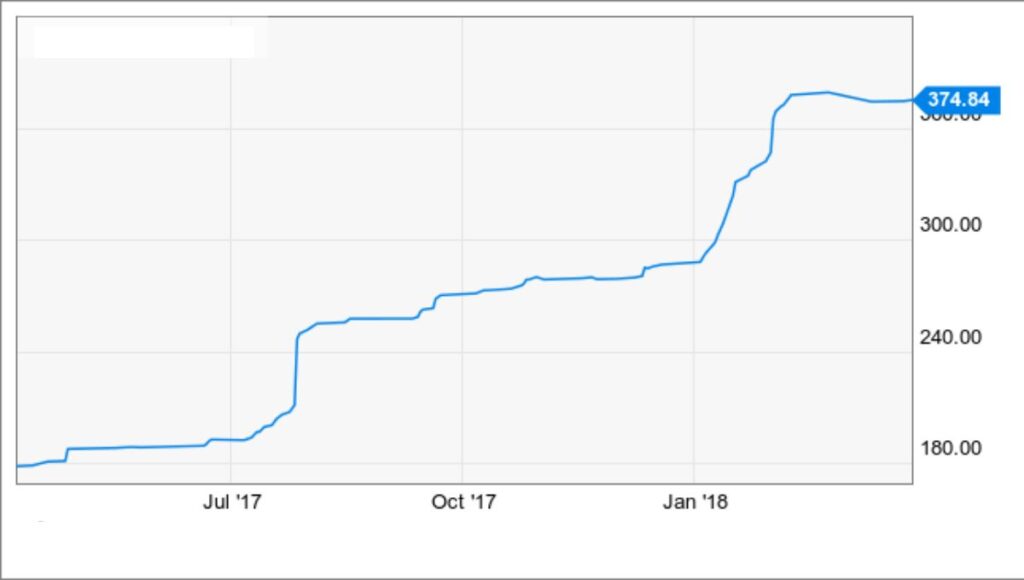Boeing (BA) Stock Current Performance
Boeing Stock Performance April 2024
As of April 2024, Boeing (BA) stock is trading at $169.82, a significant decline from its previous year’s high of $260.66. The aerospace and defense sectors, which Boeing operates in, have faced several challenges recently, impacting the company’s stock performance.
Despite this decline, Boeing remains a prominent player in the aerospace industry, with a strong order backlog and promising prospects for future revenue. However, the company’s financial performance has been affected by various factors, including production issues, safety concerns, geopolitical tensions, and the global economic recovery from the COVID-19 pandemic.
Fintechzoom Financial Analysis of Boeing
Boeing’s Revenue For The Recent Fiscal Year
In its most recent fiscal year, Boeing reported revenue of $77.79 billion, a decrease from the previous year due to the ongoing challenges faced by the company. However, the company’s earnings per share (EPS) improved to -$0.19, a positive trajectory compared to the previous year’s performance.
Boeing’s Cash Flow And Debt Management
While Boeing’s cash flow has been impacted by the pandemic’s effects on air travel demand, the company has taken steps to manage its debt levels. As of the latest financial reports, Boeing’s debt stood at approximately $62.4 billion, a significant burden but one the company is actively addressing through cost-cutting measures and strategic initiatives.
Fintechzoom Boeing (BA) Stock Ratings and Price Targets

Financial Analysts’ Outlook On Boeing
According to Fintechzoom’s analysis, Boeing stock currently has a consensus rating of “Moderate Buy” from financial analysts. This rating reflects the analysts’ belief in the company’s long-term potential and its ability to navigate the challenges it currently faces.
Price Targets For Boeing Stock
The average price target for Boeing stock, as determined by Fintechzoom analysts, is $229.35, representing a potential upside of 35.06% from its current trading price of $169.82. However, it’s important to note that price targets can vary widely, with some analysts setting targets as low as $140 and others as high as $275.
Which Factors Influence Boeing Stock?
Factors influencing Boeing stock performance: Several factors can influence Boeing’s stock performance, including:
Contracts And Order Backlog
Boeing’s ability to secure new contracts and maintain a strong order backlog is crucial for its future revenue visibility and growth prospects.
Production Issues
Boeing has faced significant production issues, particularly with its 787 Dreamliner program, which has led to delays and financial penalties.
Safety Concerns
Following several high-profile incidents, Boeing has been under intense regulatory scrutiny regarding the safety of its aircraft, which has impacted its public image and financial performance.
Geopolitical Tensions
Geopolitical factors, such as trade disputes and changing defense spending priorities, can significantly impact Boeing’s business.
Competition
Boeing faces stiff competition from rival Airbus and other aerospace companies, which can influence its market share and pricing power.
Commercial Air Travel Demand
The demand for commercial air travel is a key driver of Boeing’s commercial aviation business, and any shifts in this demand can impact the company’s performance.
Fintechzoom Investor Considerations for BA Stock

Investor considerations for Boeing stock: When considering an investment in Boeing stock, investors should weigh the following factors:
Diversified Business Model
Boeing’s diversified business model, spanning commercial aviation, defense, and space exploration, provides a level of resilience against downturns in any single market segment.
Financial Health
While Boeing’s financial performance has been impacted in recent years, the company’s strong cash flow and ongoing efforts to manage its debt levels suggest a path to long-term financial stability.
Strategic Initiatives
Boeing has implemented several strategic initiatives, including research and development investments, strategic partnerships, and cost-cutting measures, aimed at bolstering its competitive position and improving its financial outcomes.
Risks
Investors should be aware of the risks associated with investing in Boeing stock, including production delays, safety issues, regulatory scrutiny, and geopolitical tensions, which could continue to impact the company’s stock performance and financial results.
Related This Post
2024 Update
In 2024, Boeing has faced several significant challenges and opportunities that have shaped its stock performance and financial landscape. Here are some key updates:
787 Dreamliner Production Issues
Boeing has continued to grapple with production issues related to its 787 Dreamliner program, leading to further delivery delays and financial penalties. The company has implemented various measures to address these issues, including organizational restructuring and increased quality control measures.
Regulatory Scrutiny
Following several high-profile safety incidents in previous years, Boeing has remained under intense regulatory scrutiny from aviation authorities worldwide. While the company has made progress in addressing safety concerns, ongoing investigations and potential fines have weighed on its financial performance and public image.
Defense Contracts
Despite challenges in its commercial aviation business, Boeing’s defense and space segments have performed relatively well, benefiting from increased defense spending by the United States and its allies. The company has secured several lucrative government contracts, including contracts for new fighter jets and satellite technology.
Competition With Airbus
The rivalry between Boeing and Airbus has intensified, with both companies vying for market share in the commercial aviation sector. Airbus has made significant gains in some key markets, putting pressure on Boeing to remain competitive through innovative products and aggressive pricing strategies.
Global Economic Recovery
As the global economy continues its recovery from the COVID-19 pandemic, air travel demand has gradually increased, providing a tailwind for Boeing’s commercial aviation business. However, the recovery has been uneven across different regions, and lingering supply chain disruptions have posed challenges for the company.
Strategic Partnerships And Investments
To bolster its competitive position and accelerate innovation, Boeing has pursued strategic partnerships and investments in emerging technologies. These include partnerships with companies specializing in electric and hybrid-electric propulsion systems, urban air mobility solutions, and advanced manufacturing techniques.
Environmental, Social, And Governance (Esg) Initiatives
In response to increasing investor and stakeholder demands, Boeing has prioritized its ESG initiatives, focusing on reducing its environmental footprint, promoting diversity and inclusion within its workforce, and enhancing corporate governance practices.
As Boeing navigates these challenges and opportunities, its stock performance and financial outcomes will continue to be influenced by a range of factors, including industry-wide developments, specific events, and the market’s reaction to the company’s strategic initiatives and performance.
Investors and financial analysts will closely monitor Boeing’s progress in addressing production issues, resolving regulatory scrutiny, and capitalizing on growth opportunities in both commercial and defense markets.
The company’s ability to adapt to evolving market conditions, maintain a strong order backlog, and deliver on its strategic objectives will be crucial in shaping its future trajectory and determining the potential upside or downside for its stock.
Conclusion
As Boeing navigates challenges and opportunities in 2024, its stock performance hinges on addressing production issues, resolving regulatory scrutiny, and capitalizing on growth in commercial and defense markets.
Key factors influencing Boeing’s future trajectory include progress on the 787 Dreamliner, managing regulatory investigations and fines, securing defense contracts, competing with Airbus, benefiting from the global economic recovery, forming strategic partnerships for innovation, and prioritizing environmental, social, and governance initiatives.
Investors and analysts will closely monitor Boeing’s ability to adapt to market conditions, maintain a strong order backlog, and deliver on strategic objectives, as these factors will shape the potential upside or downside for its stock.
Meet James John, the luminary mind behind FinanceQuasar. With a passion for demystifying finance, James is a seasoned expert dedicated to simplifying complex concepts. His insightful articles illuminate the financial cosmos, guiding readers towards prosperity. Join James on this enlightening journey, as he shares his wealth of knowledge and expertise.







